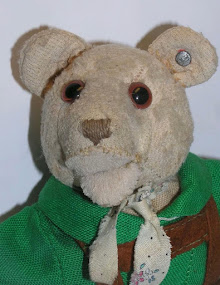"I keep watching your videos and love your travel companion Bub. Especially his background, why he is constructed the way he is and the scarcity of material at the time. I was trying to find a bear like him and it was harder than I thought. I found one finally on eBay. Do you think his Lederhosen and green linen shirt are original? They seem to be as they fit beautifully. Also the linen shirt appears to be the same type of weave as his body. It is also hard to find literature. Do you know of any literature which deals with this particular design of the head jointed animal dolls in substitute material? Thank you in advance for any help or insight you can provide.
Cheers, Marcus"
It's a clothes call when it comes to this great bear. Yes, indeed this is one of Steiff's irresistible prewar animal dolls. Not a lot is published about them and most information needs to be distilled from catalog listings and through historical context and interpretation. This cute cub has the head of the beloved Steiff Teddy Baby design and the body of a simple doll. He is head jointed, has dangling arms, and a solidly stuffed torso and legs. His head, hands, and the tops of his flat feet are made from what looks like light blonde woolen or mohair plush; it is hard to exactly tell from the photos. His body and limbs are made from a flesh colored fabric. His face is detailed with brown and black glass pupil eyes, a brown hand embroidered nose, and a smiling, tan felt lined mouth. You can see his long trailing "f" Steiff button in ear and traces of his red ear tag in the photo here on the left. He wears a green linen shirt and brown felt shorts. These articles are well fitting and appropriate for him but were "mommy made" and not manufactured by Steiff. You can tell because: 1. the shirt color is far too vibrant and without wear and should have faded in proportion to the aging on the bear, and 2. the shorts - they are cute - but not of Steiff clothing quality.
This Teddy Baby doll was one of several different animal dolls produced in the 1930s and 1940s. Other popular models included a number of rabbits, a cat, a pug (picture here on the left, photo from Steiffgal's collection), an elephant, a Scotty, and a German Shepherd. Regardless of size or date of manufacture, each of these pre-war treasures produced from 1931 onward was branded as Steiff with an ear button and ear tag. However, unlike most other Steiff products of the 1930’s and 1940’s, these dolls did not leave the factory in Germany with chest tags. The IDs on Marcus' bear suggest that he was made in the early to mid-1930s at the latest.
It's a clothes call when it comes to this great bear. Yes, indeed this is one of Steiff's irresistible prewar animal dolls. Not a lot is published about them and most information needs to be distilled from catalog listings and through historical context and interpretation. This cute cub has the head of the beloved Steiff Teddy Baby design and the body of a simple doll. He is head jointed, has dangling arms, and a solidly stuffed torso and legs. His head, hands, and the tops of his flat feet are made from what looks like light blonde woolen or mohair plush; it is hard to exactly tell from the photos. His body and limbs are made from a flesh colored fabric. His face is detailed with brown and black glass pupil eyes, a brown hand embroidered nose, and a smiling, tan felt lined mouth. You can see his long trailing "f" Steiff button in ear and traces of his red ear tag in the photo here on the left. He wears a green linen shirt and brown felt shorts. These articles are well fitting and appropriate for him but were "mommy made" and not manufactured by Steiff. You can tell because: 1. the shirt color is far too vibrant and without wear and should have faded in proportion to the aging on the bear, and 2. the shorts - they are cute - but not of Steiff clothing quality.
This Teddy Baby doll was one of several different animal dolls produced in the 1930s and 1940s. Other popular models included a number of rabbits, a cat, a pug (picture here on the left, photo from Steiffgal's collection), an elephant, a Scotty, and a German Shepherd. Regardless of size or date of manufacture, each of these pre-war treasures produced from 1931 onward was branded as Steiff with an ear button and ear tag. However, unlike most other Steiff products of the 1930’s and 1940’s, these dolls did not leave the factory in Germany with chest tags. The IDs on Marcus' bear suggest that he was made in the early to mid-1930s at the latest.
These sweet animal dolls were all dressed for success. Their clothes were removable, charming, lovingly stitched, and produced from the finest cottons, calicos, felt, and other materials. They were dressed as boys or girls, or in in occupationally or nationally inspired clothing. Numerous outfit variations were available for some of the more popular models. For example, Steiff’s Puppkatz or cat doll, which was introduced in 1931, was available in up to 11 different outfits over time. These included pajamas, dresses, swimsuits, playsuits, and traditional German attire including dirndls and trousers. Here on the left, you can see a c. 1938 catalog page showing Marcus' Teddy Baby bear featured at the top of the image; his nine original outfits at the time are noted next to his image. You can click on the image to make it larger.
Steiffgal hopes this discussion on Steiff's delightful Teddy Baby doll bears has been a two for one experience for you.













